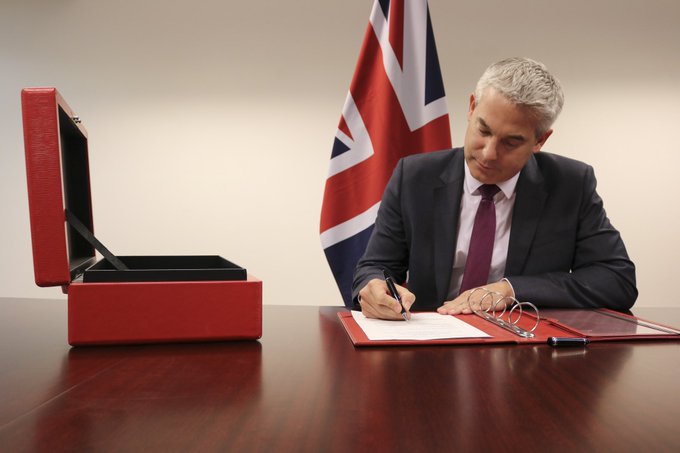132 Brexit undergoes massive hashtag onslaught
If muskets and halberds were to hand,then all sides in the Brexit debate would by now have resorted to using them.
The current version of Leave / Remain -whatever happens next ,has the UK bidding the 27 adieu on October 31st.
And,of course the interminable exchange of invective and partisan ideological opinion,half-truth and intemperate persiflage continues unabated; only the hashtags have changed and continue to do so over time.
#Yellowhammer refers to the cache of civil service documents exploring possible scenarios of economic difficulties the UK might encounter following our actual departure from the EU,were it to go ahead,on October 31.
#RecallParliament is the cri de coeur of disparate forces under the Remain banner who are convinced that Prime Minister Johnson will in effect force the UK into what they feel is a wholly precipitous departure from the EU on October 31 via potential machinations involving what might be considered violations of acceptable parliamentary procedure.
However the “Public Law for Everyone ” site sheds some considerable insight and understanding on the entire constitutional imbroglio. Herewith gleaned in full…
The Brexit Secretary says he has “set in stone” the repeal of the European Communities Act 1972 — but the legal significance of this misleading claim is very limited
Earlier today, the Secretary of State for Exiting the European Union, Stephen Barclay MP, posted a tweet saying that he had “signed the legislation setting in stone the repeal” of the European Communities Act 1972 (ECA). (The ECA is the UK statute that gives effect to EU law in the UK’s domestic legal system.) He went on to assert that this is a “landmark moment” because it “underlines that we are leaving the EU on 31 October”.
There is no legal reason why this could not happen again — and, crucially, bringing section 1 of the EUWA into force makes absolutely no difference to this point. Whether section 1 is in force or not, it only produces legal effects from “exit day”. It follows that if, for example, Parliament were to require the Government to seek, and if the European Council were to grant, a further Article 50 extension, the definition of “exit day” could be further amended in order to ensure that the ECA was repealed only with effect from the new, later date of the UK’s departure from the EU. This, in turn, means that — contrary to his claim — the Brexit Secretary has not “set in stone” the repeal of the ECA. The EUWA explicitly contemplates that “exit day” can be changed in order to enable it to be aligned with the actual date of the UK’s departure from the EU.
This leads on to a further, and critical, point. “Exit day” is a concept whose relevance liis wholly in domestic law. It is the date on which various provisions of the EUWA swing into action, in order to ensure that the domestic legal consequences of leaving the EU are appropriately managed — including by converting vast swathes of EU law into domestic law. However, the domestic definition of “exit day” has no bearing whatever on when and whether the UK leaves the EU. That is a matter that is governed exclusively by EU law. Similarly, whether the ECA is in force or not has no bearing on whether or when the UK leaves the EU — although if the UK were to repeal the ECA before leaving the EU, it would immediately be in breach of EU law. From this, it follows that whether the ECA is repealed or not is neither here nor there when it comes to whether or when the UK leaves the EU. All it is relevant to is whether, for as long as it remains a member, the UK does or does not comply with the legal obligations under the EU Treaties that are binding on it in international law.
All of this demonstrates that the legal significance of bringing section 1 of the EUWA into force is extremely limited. It does not “set in stone” the repeal of the ECA, because the legal meaning of “exit day” can be changed and the date of the ECA’s repeal deferred. It does not prevent the UK Government from seeking an Article 50 extension. It does not prevent Parliament from legislating to require the UK Government to seek an Article 50 extension. It does not prevent the European Council from granting an extension if the UK Government asks for one, whether of its own volition or at Parliament’s insistence. And it does not prevent Parliament, if it so wishes, from legislating to revoke the UK’s notification under Article 50, thereby stopping the Brexit process in its tracks. The politics, of course, are another thing. But any suggestion that ECA repeal has been “set in stone”, or that this somehow locks in 31 October as the inevitable date of the UK’s departure from the EU, is wrong as a matter of law. ECA repeal, and Brexit itself, are no more “set in stone” today than they were in the spring, when “exit day” was twice redefined in domestic law and the Article 50 period was twice extended as a matter of EU law.
And so it goes…



Comments
Post a Comment